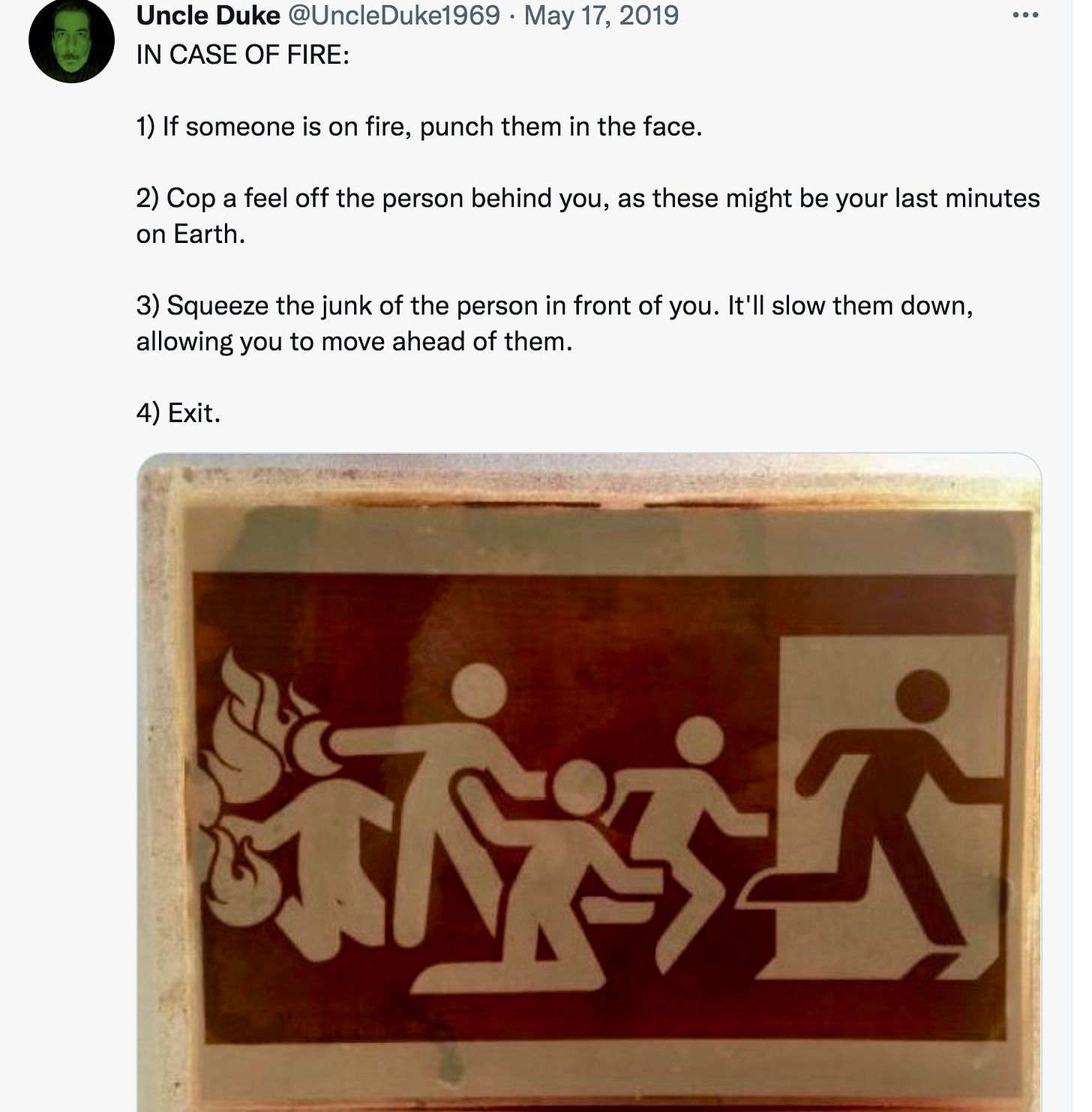Picayune Plus: Mass shootings seem to be the cost of 'freedom'
Guns in civilian hands should not be able to fire this fast, yet here we are
To read this issue in your browser, click on the headline above.
Eric Zorn is a former veteran news columnist for the Chicago Tribune. Longer bio and contact information is here. This issue exceeds in size the maximum length for a standard email. To read the entire issue in your browser, click on the headline link above.
I count 41 shots fired in 17 seconds — which includes about 8 seconds during which the shooter evidently reloaded — in the video below from Monday’s horrifying slaughter at north suburban Highland Park’s Independence Day parade:
At this writing, police are saying only that the assailant was using a “high-powered rifle,” which is usually cop-speak for an AR-15 style firearm. Gun enthusiasts have scolded me for referring to such semi-automatic rifles as “weapons of war” since, despite their cosmetic similarity to military grade automatic rifles, they are not literally used in armed combat.
My temptation is to offer an argument that there is such limited legitimate citizen utility for a gun that can fire that fast and strike with such lethality that we should severely restrict private ownership (as we do with automatic rifles, commonly called “machine guns”). Such limits almost certainly wouldn’t put a significant dent in the number of gun murders in this country, but it would mark a salutary change in our nation’s grisly relationship to guns.
But why waste the pixels? If the massacres of children at Sandy Hook and Uvalde didn’t prompt such a change, Monday’s dreadful executions in Highland Park certainly won’t.
My “Sez Who?” initiative
I’ve added the line “Eric Zorn is a former veteran news columnist for the Chicago Tribune” to the top of this publication as part of my mission to call attention to the ridiculous print-journalism tradition of waiting until the very end of op-ed essay or opinion piece to explain whose views we’ve been reading and where they’re coming from.
I refer to descriptions such as these clipped from the bottoms of recent Tribune op-eds —
Elizabeth Shackelford is a senior fellow on U.S. foreign policy with the Chicago Council on Global Affairs. She was previously a U.S. diplomat. Dina Smeltz is a senior fellow on public opinion and foreign policy at the council and was previously a division chief and analyst at the U.S. State Department’s Office of Opinion Analysis in the Bureau of Intelligence and Research.
Katherine Kinzler is a professor and the chair of the psychology department at the University of Chicago and author of “How You Say It.”
Edward Linn is a recently retired obstetrician and gynecologist and women’s health physician and also the former chair of the OB-GYN department at Cook County Health and Rush University. Miles Zaremski has been a Chicago area-based practicing attorney for nearly 50 years and a writer, with an expertise in health law, health law policy and litigation.
It’s a bizarre, reader unfriendly convention, and the only excuse for it I can think of is that, well, just about every newspaper has just about always done it that way.
When quoting sources in news stories, convention demands speedy attributions of speakers that includes with their affiliations and/or credentials, as in —
“That has a lot of people scared and, I think, rightfully so,” said Sydney Duncan, who specializes in representing members of the LGBTQ community at the Magic City Legal Center in Birmingham.
“People would love to see the Bears come, but they don’t want their property taxes to increase, and they don’t want traffic nightmares,” Arlington Heights Mayor Tom Hayes said. “We’re still in the process of evaluating what we might be able to do from a financial perspective. … We want to make this happen, so we’ll have to see what their needs and our abilities are, and try to balance the two.”
I suppose one counter to this might be that argumentative writing should stand and fall on its own merits, and that fully identifying the writer in advance stands to prejudice the reader either favorably or unfavorably. But if that were the case, then publications would follow the practice that the New Yorker used to follow of saving bylines until the end.
What say you, defenders of this tradition?
A question for those who say they oppose abortion except in cases of rape
How do you think this exception would work, exactly? Logically it would have to rely on self-reported allegations of rape, not criminal convictions or even criminal charges, right? Because perpetrators aren’t always identified and in cases of acquaintance rape the perpetrators are likely to claim that the sex was consensual and law enforcement might not believe the evidence is strong enough to warrant charges. Criminal cases can take many, many months, even years, to resolve.
Would a police report be required for a rape exemption? And if so, would you want it left up to detectives to determine if an allegation is “abortion worthy”? And since pregnancy that occurs as a result of incest is usually included in this part of the discussion, do you envision some sort of Rape/Incest Inquisition Panel that hears testimony and issues a ruling? Do you think that cops or some crew of inquisitors (elected? appointed?) is better qualified to make the decision about terminating a pregnancy than the woman and her family and her doctor?


Notes and comments from readers —lightly edited —- along with my responses
Some of these messages are in reference to items in last Thursday’s Picayune Sentinel.
Ted P. — The point of Ken Griffin’s massive campaign spending was to poison the political well with a broad attack on criminal justice reform, which Richard Irvin blamed for a “crime wave.” The atmosphere created helped Bailey. Many Democratic legislators in the state are now running scared of being blamed for crime because they voted for the SAFE-T Act. This is the standard Trump-Republican playbook.
Attacks on the Safety, Accountability, Fairness and Equity-Today Act (known as SAFE-T), are premature, at best, as it’s too early to make any causal connection between increases in certain crime rates and provisions in the act, which was passed in January, 2021, but contains changes that have yet to go into effect (the controversial elimination of cash bail, to wit, is not set kick in until next year). There’s nothing at all new about Republicans promising somewhat vaguely to get tough on crime as well as to cut wasteful spending and to lower your taxes.
Steve R — I'm not a Donald Trump fan, but Cassidy Hutchinson’s statement that she heard that then-President Trump tried to grab the steering wheel away from the Secret Service in order to redirect his motorcade to the Capitol is classic hearsay and would be inadmissible in court.
I believe that Hutchinson truthfully related what someone else told her, but I take your point about hearsay. The committee chair probably should have interrupted her to underscore that she was not a first-hand witness to this alleged event, but that those who were witnesses to it are more than welcome to come give their version of events under oath.
Not issuing such a reminder was a mistake because the dispute about wheel-grabbing has been a distraction from the main point, which no one seems to dispute, which is that Trump badly wanted to join the marchers/mob at the Capitol, and he knew that they were armed as he sent them off.
Marc M. — I voted “yes” in your click poll asking “Should Evanston lift its ban on women going topless in public?” because I think city residents should be logically consistent in their world view, not because I think it’s a good idea. But I question why they would stop short of allowing full nudity anywhere at all times. If “sexualizing” human anatomy is inappropriate and a violation of emerging norms of gender fluidity, then why have any restrictions?
The argument ultimately comes down to cultural norms and values, which are under challenge in many ways these days. For both and all genders, genitals are naturally sexualized since they’re the organs that complete the sex act. And rear ends — butts —are sexualized and also stigmatized as the locus of elimination, to put it delicately.
In certain cultures — mostly primitive, hunter-gatherer cultures — women don't modestly cover their breasts (and finding photo essays about such cultures in National Geographic was a particular thrill for pre-adolescent boys in the 1960s, I can tell you!) Other cultures go the other way and require women to cover their legs, hair, and even faces. I doubt Evanston society will come crashing down if the ban on topless women in public is lifted, in part because I doubt many women will take advantage of the opportunity.
It turns out that voters on Nantucket earlier this year overwhelmingly approved the idea of allowing women to sunbathe topless on their beaches, but since bared female breasts in public would violate state law, the change is on hold.
State law in Illinois doesn’t seem to address this issue, banning only “a lewd exposure of the body done with intent to arouse or to satisfy the sexual desire of the person.” (720 ILCS 5/11-30)
A Tribune/Pioneer Press story quotes an Evanston City Council member to the effect that “Skokie, Wilmette, Winnetka and Kenilworth currently have no laws on the book against toplessness regardless of gender.”
Dan P. — I have a digital only subscription to the Tribune: $6.50 for the six months ending in mid-July. Back in January I was going to cancel in response to the draconian cuts but when I called they offered to renew my digital only access for a quarter a week.
I called today (thanks for the prompt) to let them know I’ll cancel if the rate goes up when the six months ends in mid-July. Given their bogus, opaque subscription billing process which you have called out repeatedly, they’d only say the same rate should take effect for the next six months, though they reserve the right to raise the rate and will let me know if that’s happening.
For what it’s worth, I won’t continue if they try to impose the going rate when the current six month window closes. I’d be willing to pay more than a quarter a week, but not their ridiculous and invisible rate. FYI, the phone representative was completely unable to advise me of the current going rate.
My purpose in sharing this is to say that it is possible to have the digital only subscription for $13 a year.
$13 a year is a loss-leader price: too low to sustain the publication and insufficient to reflect the value of the product. We all understand special introductory offers and teaser rates to get new customers to try a product. But the lack of transparency in pricing and the stealthy way prices rise at the Tribune (and other publications, to be sure) is infamous.
John B. — The Founders’ attempt to prevent majority factions from utterly dominating minority factions has completely backfired. We’re now living in a time of political apartheid in which the minority faction holds tremendous power.
Supreme Court rulings consistently don’t reflect majority public opinion. Due to the anti-Democratic nature of the Electoral College, Democrats mathematically and practically cannot win the presidency without winning by millions of votes nationwide. And the design of the Senate along with the filibuster rules puts great power into red states. How is this sustainable?
This is a great question. The nation has certainly survived times of greater division than what we’re experiencing now — the Civil War comes to mind — but it’s long seemed to me that the structure of the republic is based on the assumption that the views and passions of minority factions would serve as a moderating force to rein in the views and passions of majorities. And that the sort of long-term divisions marked by minority control that appear to be in our futures will be a major stress test for the concept itself.
How many presidents can we have who were elected with a minority of the popular vote? How many initiatives in the U.S. Senate can be blocked by super-minorities of senators? How many times will citizens have to accept grotesque gerrymandering that perverts the popular will? How many U.S. Supreme Court decisions that insult the popular will can we endure? Before… what? States like California or New York or even Illinois mount serious if peaceful issues to form sovereign nations? There is open armed conflict in the streets?
Edward C. — The anger directed to the Supreme Court is misplaced. They simply ruled that abortion is not a federal decision so the decision returns to the state. Or more correctly, to the voters. Anyone in a state that prohibits abortion has elected officials that made that law. What no one seems to mention is that maybe just maybe the will of the people in said state is against abortion. Egads! That can’t possibly be!
Egads! yourself. Substitute “interracial marriage” for “abortion” in your letter. Or “segregated public schools” or “women’s right to vote” or “an accused person’s right to an attorney.” Or, for that matter, “a person’s right to purchase contraceptives.” And you’ll see, I hope, that there are some rights that ought not be subject to a popular vote or the whims of public officials. I put abortion rights into that category.
Michael N. — To my knowledge, there are no total abortion bans. Perhaps I'm wrong? Nor, to my knowledge, are there any states in which abortions of ectopic pregnancies are prohibited. Indeed, the Roman Catholic Church permits abortions of ectopic pregnancies because they are unnatural.
Unnatural? That's an odd word to describe a natural occurrence in 1-2% of pregnancies. The fear is that doctors won't act quickly because they may not feel they can justify the "life of the mother" exception -- not all ectopic pregnancies are fatal to the woman yet they are virtually all ultimately fatal to the fetus. The confusion over this is illustrated in this astonishing apology column in The Federalist — “I Was Wrong: Sometimes It’s Necessary To Remove Ectopic Babies To Save Their Mother’s Life” — in which an anti-choicer eats a huge plateful of crow.
Do better, Tribune editorial page
The cartoon by Steve Kelly of the Pittsburgh Post-Gazette published in the Monday Tribune showed President Joe Biden sitting at his desk and saying to aides, “Forget what the polls say! I’m not too old and I’m not incontinent!” To which the aide responds, “Incompetent, sir.”
Kelly uses “incontinent” instead of, say “incongruous” or some other word that someone might mistake for “incompetent” because someone misunderstanding a word isn’t funny, but make it into a pee-pee poo-poo joke and, well! See, because the elderly are particularly prone to incontinence, and just planting the idea of an older man wetting or soiling himself is comedy gold if you have the mind of a nasty 7th grader.
How about a little quality control, what?
Ya gotta see these tweets!
I often run across tweets that are too visual in nature to include in the Tweet of the Week contest (the template for the poll does not allow the use of images). Here are a few good ones I’ve come across recently:
I’m considering adding a quick, embedded “which of the visual tweets is your favorite?” poll to this feature, then posting the winner in Thursday’s all-subscriber issue of the Picayune Sentinel. My wife is discouraging me from doing so. What say you?
Finally, a timely tweet that I wish I could have included in last week’s poll:
There’s still time to vote in the conventional Tweet of the Week poll as well as the bonus all-politics poll.
Thank you for supporting the Picayune Sentinel. To help this publication grow, please consider spreading the word to friends, family, associates, neighbors and agreeable strangers.
.























OK; I’ll bite. Giving the op-Ed opinion writer’s credentials at the end of the op-Ed is, I suppose, meant to buttress the merits of the arguments after the reader is already convinced by logic and reason, as if to say: if you aren’t already convinced, then here’s why you should be, because the writer is a credentialed “expert.” That rarely works for me, however; my reaction is instead typically, “that’s of course what I would expect from so-and-so.” But putting the credential up from would likely dissuade me from even reading the piece, so I say continue to follow to follow the existing practice.
Re: putting authors’ credentials at end of op-ed….I’ve never noticed that as an issue because I always scan the first few sentences, jump to see the author’s info then either skip it or go back and read it. The location of that small paragraph at the bottom or top is irrelevant.